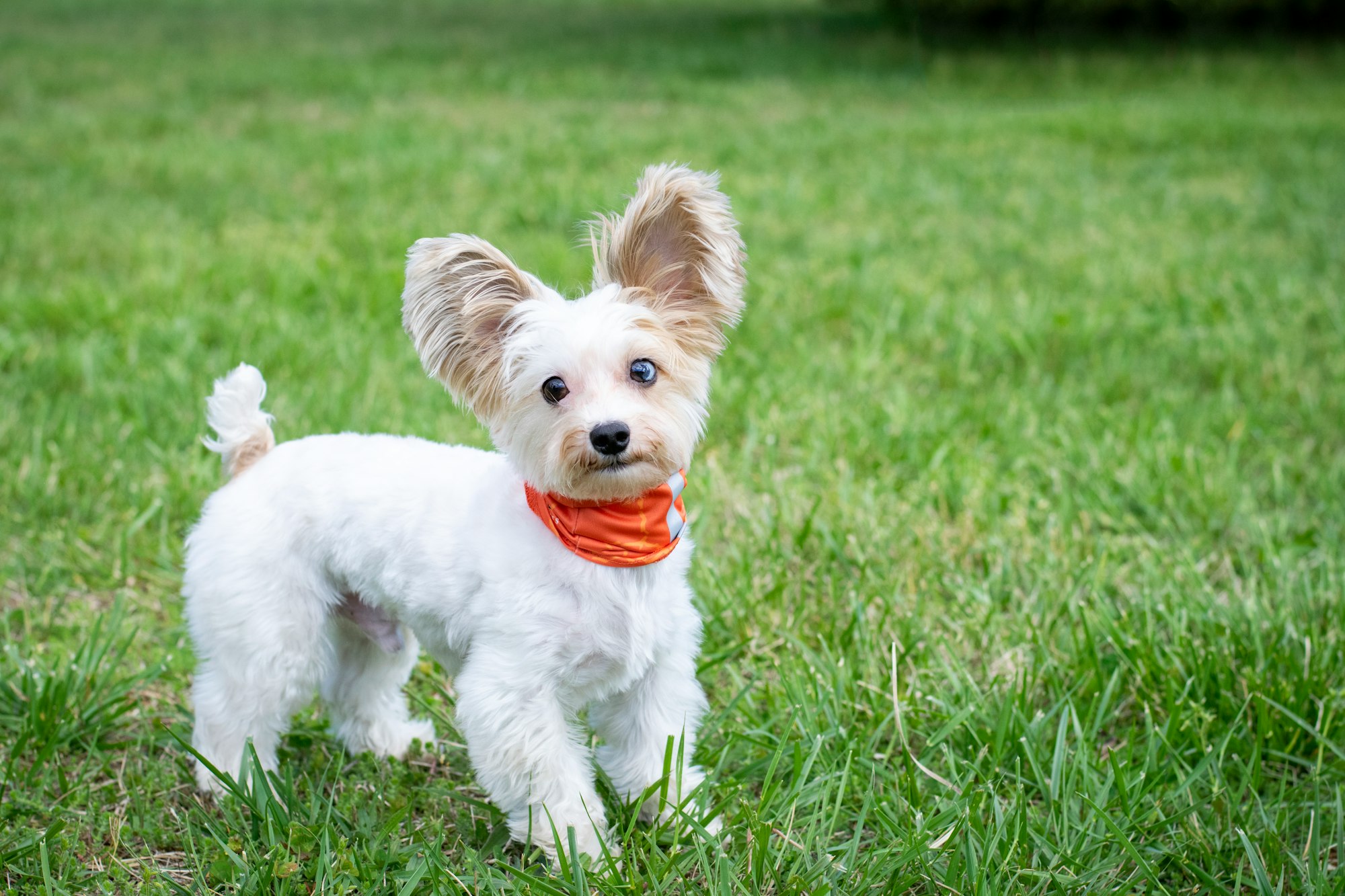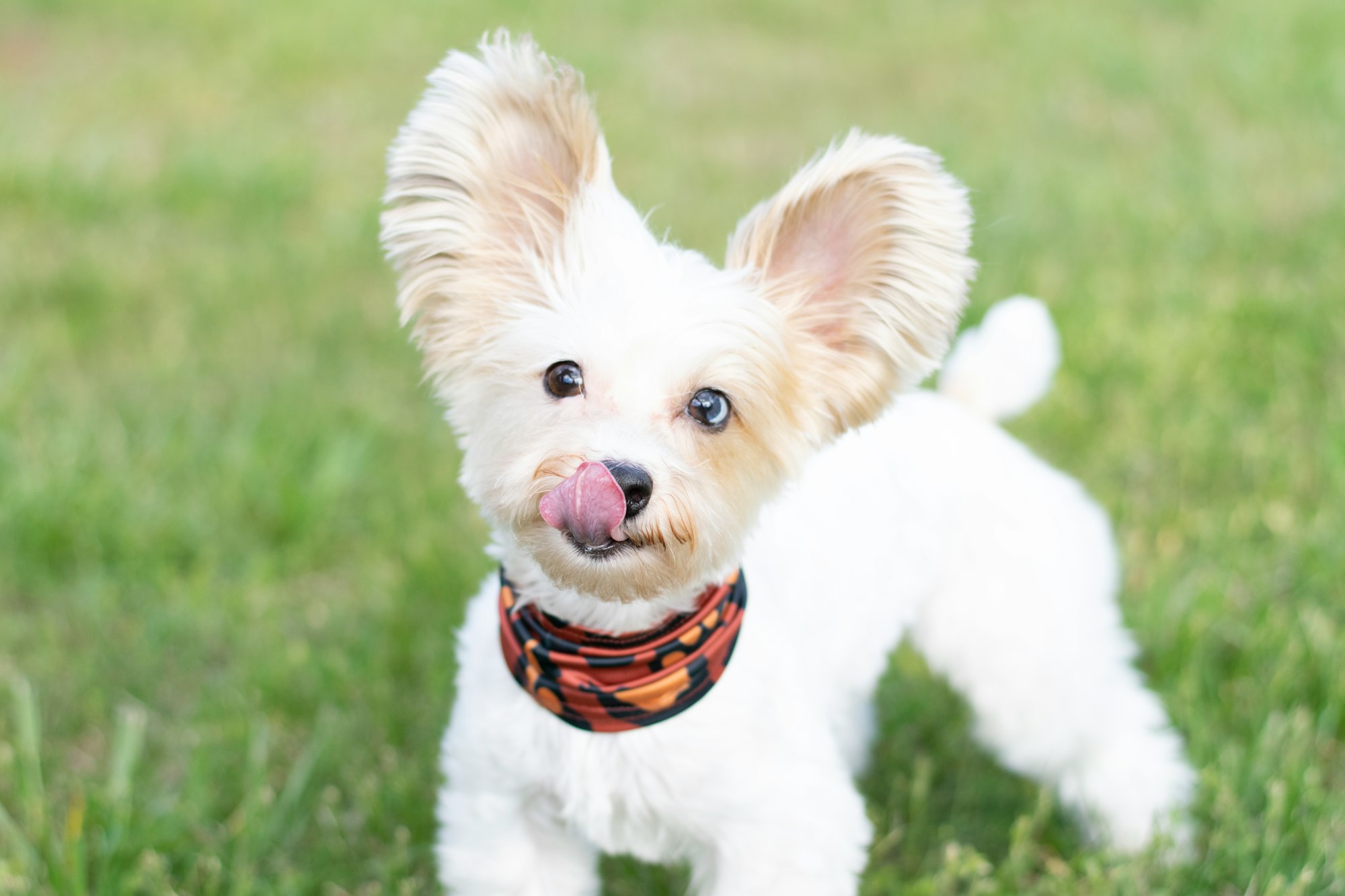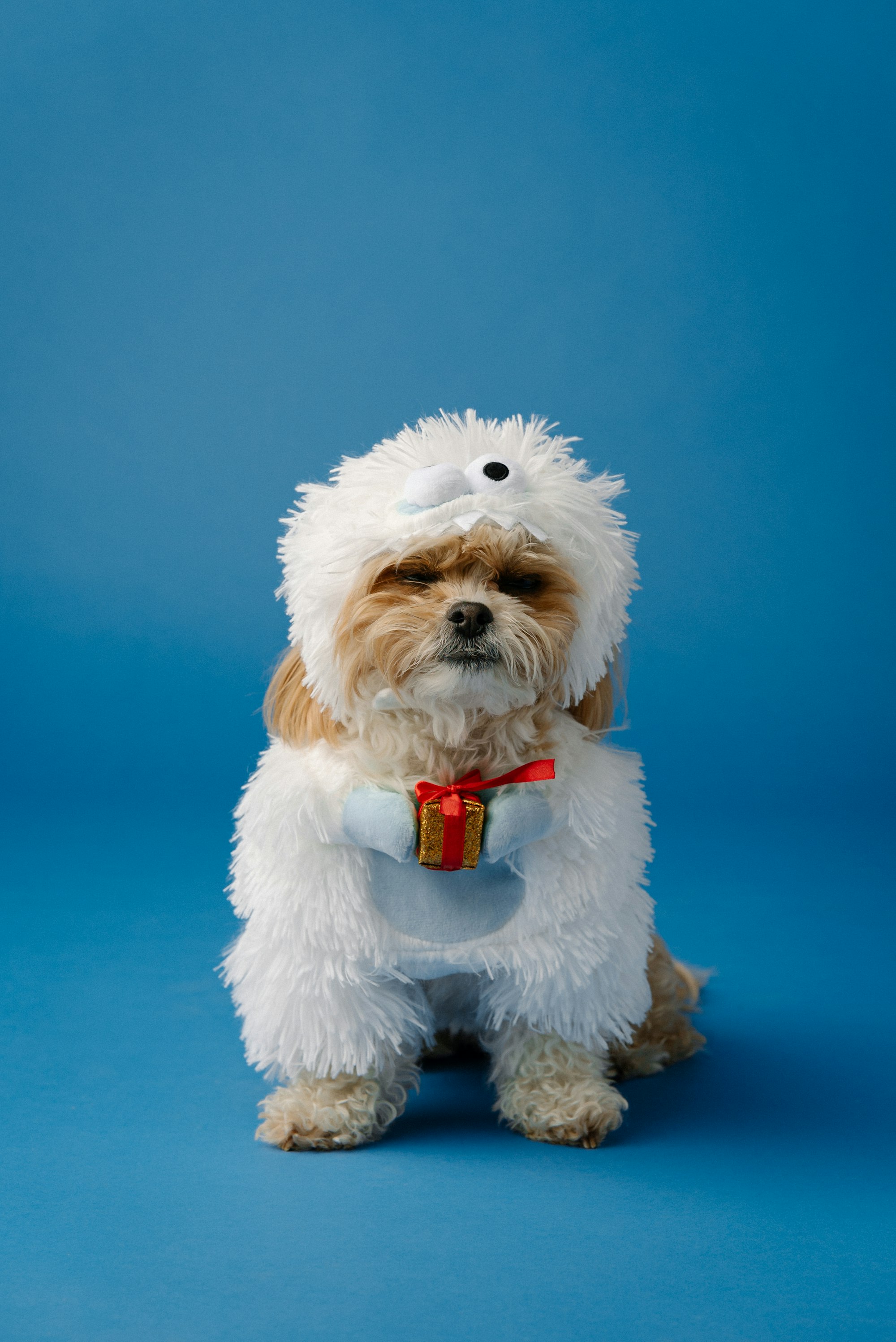When it comes to small and lovable dog breeds, the Yorkshire Terrier, or Yorkie, is a popular choice among dog enthusiasts. Known for their charming personalities and elegant appearance, Yorkies have captivated the hearts of many pet lovers worldwide. While the traditional Yorkie is recognized for its distinctive blue and tan coat, there is a rare variation of this breed that stands out from the rest - the White Yorkie. In this article, we will explore the characteristics, care requirements, and popularity of these adorable little companions.

White Yorkies, also referred to as Biewer Terriers or Parti Yorkies, are a unique variation of the Yorkshire Terrier breed. While they possess the same endearing qualities as their traditional counterparts, White Yorkies boast a distinct dog coat color that sets them apart. These enchanting canines exhibit a predominantly white coat with splashes of tan, black, or gray in various patterns.
Appearance and Coat Characteristics
White Yorkies have a distinct and captivating appearance that sets them apart from traditional Yorkies. Their coat is predominantly white, with splashes of tan, black, or gray in various patterns. Unlike the blue and tan coloration of traditional Yorkies, White Yorkies showcase a unique and eye-catching color combination.
The coat of a White Yorkie is typically long, silky, and fine in texture. It requires regular grooming to maintain its luxurious look and prevent tangles or matting. Daily brushing is recommended to keep the coat in optimal condition, and periodic professional grooming appointments are essential to trim the hair, clean the ears, and maintain overall cleanliness.
The white coat of a White Yorkie is often the main attraction for those seeking a visually striking pet. Their elegant appearance and distinctive coat patterns make them stand out in a crowd and turn heads wherever they go.
Temperament and Personality
White Yorkies possess the same delightful temperament and personality traits as traditional Yorkies. They are known for their loyalty, affectionate nature, and playful demeanor. These small dogs have big personalities and are incredibly devoted to their human companions.

Despite their small size, White Yorkies are confident, alert, and often fearless. They are known to be protective of their loved ones and make excellent watchdogs, alerting their owners to any potential dangers or intruders. However, it's important to note that excessive barking can be a behavior concern if not properly addressed through training and socialization.
White Yorkies thrive on human companionship and enjoy being part of a loving family. They are social dogs and typically get along well with other pets when properly introduced. Early socialization is crucial to ensure they develop good manners and become well-rounded dogs.
In terms of temperament, White Yorkies are known for their intelligence and quick learning abilities. They are eager to please their owners, making training a rewarding experience. Positive reinforcement methods, such as treats, praise, and rewards, work well with these smart and responsive dogs.
While White Yorkies are generally affectionate and friendly, it's important to remember that each dog has its unique personality. Some may be more outgoing and extroverted, while others may be more reserved or shy. Proper socialization from an early age can help White Yorkies develop into confident and well-behaved companions.
Health Considerations
While White Yorkies share similar health concerns with other Yorkies, it is essential to note that certain genetic factors may be more prevalent in the white variation. Responsible breeders take great care to minimize potential health issues by conducting thorough health screenings and genetic testing. Prospective owners should ensure they acquire their White Yorkie from a reputable breeder who prioritizes the well-being of their dogs.
Grooming Needs
Grooming is a significant aspect of caring for a White Yorkie. Their long, silky coat requires regular maintenance to keep it healthy, clean, and free from tangles or matting. Here are some essential grooming needs for White Yorkies:
Brushing: Daily brushing is recommended to prevent the hair from tangling or matting. Use a soft-bristle brush or a comb specifically designed for long-haired dogs. Start at the ends of the hair and work your way up to the roots, gently removing any tangles or knots. Regular brushing helps distribute natural oils, keeps the coat shiny, and prevents painful matting.
Bathing: White Yorkies should be bathed regularly, typically every three to four weeks. Use a mild, dog-specific shampoo and conditioner to maintain the coat's texture and avoid skin irritation. Be sure to thoroughly rinse out all the shampoo to prevent any residue that could cause skin problems. After bathing, gently towel-dry or use a blow dryer on a low, cool setting to prevent the coat from becoming matted.
Coat Trimming: Regular trimming is essential to maintain the shape and appearance of a White Yorkie's coat. Some owners prefer to keep their White Yorkies with a longer coat, while others opt for a shorter, more manageable length. A professional groomer can provide guidance on the best trimming style for your dog.
Ears and Teeth: White Yorkies are prone to dental issues and ear infections. Regularly check and clean their ears to prevent wax buildup or infections. Use a veterinarian-recommended ear cleaner and gently wipe the outer ear with a cotton ball. Additionally, practice good dental hygiene by brushing your White Yorkie's teeth regularly with a dog-specific toothbrush and toothpaste.

Nail Care: Trim your White Yorkie's nails regularly to maintain their length and prevent discomfort or injury. Use dog nail clippers or a grinder, and be cautious not to cut too close to the quick, which can cause bleeding and pain. If you're unsure or uncomfortable with nail trimming, consult a professional groomer or a veterinarian for assistance.
Training and Socialization
Training and socialization are crucial for White Yorkies to become well-behaved and balanced dogs. Here are some key considerations for their training and socialization needs:
Basic Obedience Training: Start training your White Yorkie with basic obedience commands such as sit, stay, come, and down. Use positive reinforcement techniques such as treats, praise, and rewards to motivate and encourage desired behaviors. Keep training sessions short, fun, and consistent to maintain your dog's focus and interest.
Housebreaking: White Yorkies, like all dogs, require proper housebreaking training. Establish a routine for regular bathroom breaks and reward your White Yorkie for eliminating in the appropriately designated area. Consistency, patience, and positive reinforcement are essential for successful housebreaking.
Socialization: Socialize your White Yorkie from an early age to ensure they feel comfortable and confident in various situations and around different people and animals. Expose them to
different environments, sounds, sights, and experiences. Arrange controlled playdates with other well-behaved dogs to promote positive interactions and prevent fear or aggression.
Leash Training: White Yorkies should be trained to walk on a leash to ensure their safety during outdoor outings. Use a properly fitted harness or collar and a lightweight leash. Start with short, controlled walks in low-distraction environments and gradually increase the duration and exposure to different environments.
Positive Reinforcement: White Yorkies respond well to positive reinforcement training methods. Reward desired behaviors with treats, praise, and affection. Avoid harsh punishments or physical corrections, as they can damage the trust and bond between you and your dog.
Exercise Requirements
Although White Yorkies are small in size, they possess a moderate energy level and require daily exercise to keep them happy and healthy. Regular walks, interactive play sessions, and engaging puzzle toys are all beneficial for their physical and mental stimulation. However, it's important to note that their exercise needs can be met within the confines of a small living space, making them suitable for apartment living.
Feeding a White Yorkie and Living Conditions
Proper nutrition is crucial for the overall health and well-being of White Yorkies. A balanced diet, consisting of high-quality dog food formulated for small breeds, should be provided. Portion control is essential to prevent obesity, which can lead to various health issues. Consultation with a veterinarian is recommended to determine the appropriate feeding schedule and dietary requirements for your White Yorkie.
White Yorkies are adaptable and can thrive in various living conditions. Their small size makes them well-suited for apartment living, provided they receive adequate exercise and mental stimulation. They are also comfortable in houses with fenced yards where they can explore and play. However, regardless of the living arrangement, they thrive on human companionship and should not be left alone for extended periods.

Finding a White Yorkie
If you're interested in adding a White Yorkie to your family, it's essential to find a reputable source to ensure you acquire a healthy and well-cared-for dog. Here are some ways to find a White Yorkie:
1. Reputable Breeders: Start by researching reputable breeders who specialize in White Yorkies. Look for breeders who have a good reputation, adhere to ethical breeding practices, and prioritize the health and well-being of their dogs. You can search online, consult local breed clubs, or ask for recommendations from veterinarians or trusted dog owners.
2. Visit Breeder Facilities: Once you have identified potential breeders, schedule visits to their facilities. This will allow you to assess the living conditions of the dogs, meet the breeder in person, and ask questions about their breeding practices. A responsible breeder will be transparent and open to answering your queries.
3. Health Clearances and Documentation: Reputable breeders will provide health clearances for their White Yorkies. These clearances typically include documentation of health screenings for genetic conditions that may be prevalent in the breed. Make sure to ask the breeder for copies of these clearances to ensure you are getting a healthy and well-bred puppy.
4. Attend Dog Shows and Events: Dog shows and events, especially those focused on Yorkshire Terriers or small breeds, can be a great place to meet reputable breeders and see White Yorkies up close. These events provide an opportunity to interact with breeders, network with other dog enthusiasts, and gather information about upcoming litters or available puppies.
5. Rescue Organizations: Consider adopting a White Yorkie from a rescue organization or breed-specific rescue group. These organizations rescue and rehome dogs in need, including White Yorkies. Adopting a happy dog gives them a second chance at a loving home and is a fulfilling way to provide a forever home to a deserving pet.

Remember, acquiring a White Yorkie is a long-term commitment, so take the time to research and find a responsible source. A reputable breeder or rescue organization will ensure that the dog you bring home is healthy, well-socialized, and a good fit for your family and lifestyle.
Cost of White Yorkies
The price of a White Yorkie can vary depending on various factors such as lineage, pedigree, and breeder reputation. Typically, White Yorkies are more expensive than traditional Yorkies due to their unique coloration. It is essential to remember that investing in a reputable breeder or rescue organization is crucial to ensure the well-being of your new furry companion.
White Yorkies in Pop Culture
White Yorkies have captured the hearts of many celebrities and found their way into popular culture. Their undeniable charm and unique appearance have made them favorites among the rich and famous. From accompanying celebrities on red carpets to starring in movies and TV shows, White Yorkies have achieved significant visibility and popularity.
Conclusion
White Yorkies stand out as an exceptional and uncommon subset of the Yorkshire Terrier breed. Characterized by their unique white coats and charming temperaments, they serve as excellent companions. However, owning one, even a Yorkie full grown, comes with specialized care needs. This includes particular grooming practices, training techniques, and vigilance for health-related issues unique to their coloration.
By dedicating the proper care, attention, and affection, a White Yorkie can be a source of immense joy and fulfillment in your life. These dogs may be small, but their ability to bring happiness is anything but diminutive.
Frequently Asked Questions
Q1. What makes White Yorkies different from traditional Yorkies?
White Yorkies possess a predominantly white coat with patterns of tan, black, or gray, setting them apart from the traditional blue and tan coloration of Yorkies.
Q2. Are White Yorkies more prone to health issues?
While White Yorkies share similar health concerns with traditional Yorkies, responsible breeding practices aim to minimize potential health issues through genetic testing and health screenings.
Q3. Do White Yorkies require special grooming?
Yes, White Yorkies have long, silky coats that require daily brushing and regular professional grooming appointments to maintain their appearance and prevent tangles and matting.
Q4. Are White Yorkies good family dogs?
Yes, White Yorkies can be suitable for families with children. However, due to their small size, they should always be supervised during interactions with young children to ensure their safety.
Q5. How can I find a reputable breeder for a White Yorkie?
To find a reputable breeder, conduct thorough research, ask for recommendations from local Yorkie clubs or veterinarians, and visit the breeder's facilities to ensure proper care and ethical breeding practices.






